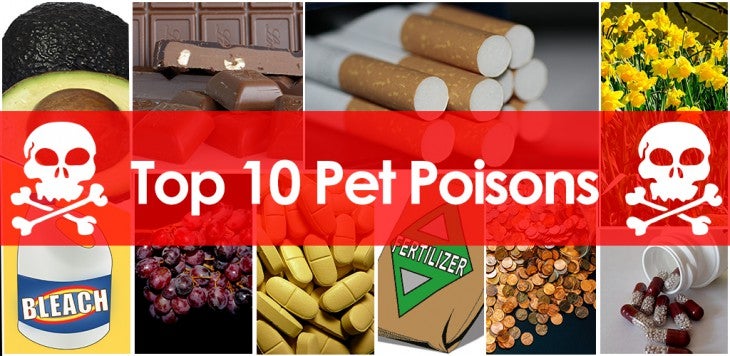Each year thousands of dogs and cats suffer from ingestion of household poisons,” according to the Pet Poison Helpline.* Now, those are very alarming numbers! The sad part is most of the poisons come from common household items that we as humans would never think of ingesting. However, your pet does not know any better.
Symptoms of Poisoning in Dogs and Cats
If you notice your dog or cat is exhibiting one or more of these symptoms: vomiting, diarrhea, drooling, coughing or vomiting of blood, pale gums, a racing heartbeat, excessive thirst or urination, absence or decreased urination, respiratory distress, sluggishness, or an unusual gait, your pet could be suffering from some type of poisoning. Do not waste time. Seek emergency veterinary medical assistance at once.
How can I Prevent Pet Poisoning? Identifying the common items that could poison your dog or cat is the key to making your home pet poison safe. It is why we prepared the following list.
Top 10 Pet Poisons
- Prescription Medications for Humans – while helpful to humans, prescription medicines can seriously harm your dog or cat, and in most cases they can be fatal. These medications include but are not limited to antidepressants, blood pressure pills, and pain medications.
How to Safeguard: make sure all medicine bottles are sealed properly and stored in a place that is inaccessible to your pet. - Over-the-Counter Medications for Humans – like prescription meds, over-the-counter medications can be just as deadly to your pet. Acetaminophen, ibuprofen and naproxen are a few examples. Even herbal and natural products such as fish oil and joint supplements can be extremely harmful to a pet.
How to Safeguard: take the same preventative steps as when pet-proofing prescription drugs. - Prescription Medications for Pets – Yes. These too. While formulated specifically for dogs and cats, pet medications can poison your furry friend through overdosing or an allergic reaction.
How to Safeguard: administer dosages as directed by your veterinarian, and watch for adverse side effects. Remember what’s good for one species or breed, is not necessarily good for another. So please do not give a med to a cat that was meant for a dog. As with human medications, properly seal and store your pet’s medications. - Household Cleaners – Bleach, detergent, degreasers, disinfectants, anti-freeze, paint, paint thinner, swimming pool cleaners can gravely hurt your pet. Basically if it is harmful to humans, it’s harmful to pets.
How to Safeguard: keep all bottles and containers properly sealed and stored in an area where your pet can’t get to it. Also, throw out any empty containers; there might be enough residue to cause harm to your pets. - Foods for Humans – That’s right! Certain foods meant for human consumption could poison your pet. Chocolate, alcohol, avocado, grapes & raisins, macadamia nuts, onions, meats with bones, chewing gum and xylitol (a sweetener) to name just a few.
How to Safeguard: don’t feed your dog or cat food that was meant for humans. Regardless of how much they beg. - Plants– while they might appear appetizing to your pet, most plants can prove to be a fatal attraction if your dog or cat eats them. Plants to avoid: azaleas, rhododendrons, tulips, daffodils, sago palms, lilies, foxglove, and philodendron are only a few that can and will cause serious health problems.
How to Safeguard: consult with your veterinarian as to which plants or flowers are harmful to your pets before you plant a garden. - Insecticides and rodenticides – It’s needless to say, but if it was meant to kill an insect or a rat, it can and will kill your pet.
How to Safeguard: properly seal and store any opened containers, and dispose of any empty containers. Also, apply these products in areas where you know your pet can’t access them. - Lawn and garden products – fertilizers, and weed and feed products might nourish your lawn and make your garden grow, but they are harmful to pets.
How to Safeguard: Seal and store unused portions, properly dispose of empty containers. - Heavy metals – such as lead, mercury, zinc or other metals can be quite harmful if ingested. Lead can be found in paint chips, and linoleum especially in older homes. Zinc can be found in pennies minted after 1982.
How to Safeguard: keep your pets away from home remodeling sites or demolition areas. Also, don’t leave loose change lying around. - Tobacco products – just like humans, smoking and ingesting tobacco products can be hazardous to your pet’s health. How to Safeguard: If you must smoke, do so in a well-ventilated area and keep tobacco smoke and products away from pets.
*Guide to Pet Safety. (2016) https://www.petpoisonhelpline.com/pet-owners Accessed on May 5th 2016.
Do you have tips on how to poison proof your home?
Please let us know in the comments section.





